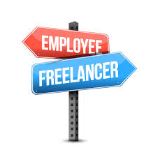THE COMING AGE OF FREELANCERS

The way we work is constantly changing. From assembly-line robot-like nine-to-five days, we have now moved to working from home and other flexible work arrangements. In the coming years, we will all become freelancers. This piece examines the rise of this phenomenon, and what you must ask yourself if you wish to be one.
The recent trend of work has been towards ‘casualisation’ throughout the world. This is perhaps not a pronounced in the third world yet, but in developed countries like Australia or the United States, more and more firms are showing a preference toward employing people on a part-time or a casual basis than handing them full time contracts.
Employees, too, have been leaning toward casual and ‘work from home’ arrangements with their main firm so that they can take the extra time to earn some side income with their freelance arrangements. There are three main reasons for this phenomenon.
1. Technology has become ubiquitous
Not more than fifteen years ago, professions such as graphic designing, printing and photography were available only to a select few who had the means to purchase the equipment required. Also, the feedback loops required to learn these professions were much longer before. Now, with the ubiquity of technology, these crafts have become closer to everyone who has the aptitude for learning.
2. Information has become more easily accessible
With the explosion of the internet, one could learn just about anything for free, which is giving more people the power to learn something new in their free time. There is also a lot of expertise out there that guides freelancers and self-employed people in their careers. The proliferation of blogging as a possible freelance medium has given thousands of people a way to earn money by never leaving their homes.
3. The lure of flexibility
A freelancer’s life is more flexible than that of a conventionally employed person. A freelancer is typically his or her own boss, and there is enormous independence when it comes to working hours, job attire, leave etc. While this was possible for a privileged few before, now, more and more people are finding that it is within their grasp to get it.
There is a good chance that a full 40% of us will be working in freelance or ‘casual jobs’ by 2020. If you’re looking to enter the freelance market, these are the following questions you should ask yourself:
- Is there a demand for my services or is the market crowded already?
- What is the market value for my services? Can it exceed my current levels of income?
- What are my reasons to freelance?
Where would I find work and whom would I approach? Will there be enough work for me to take it up as a whole career?








